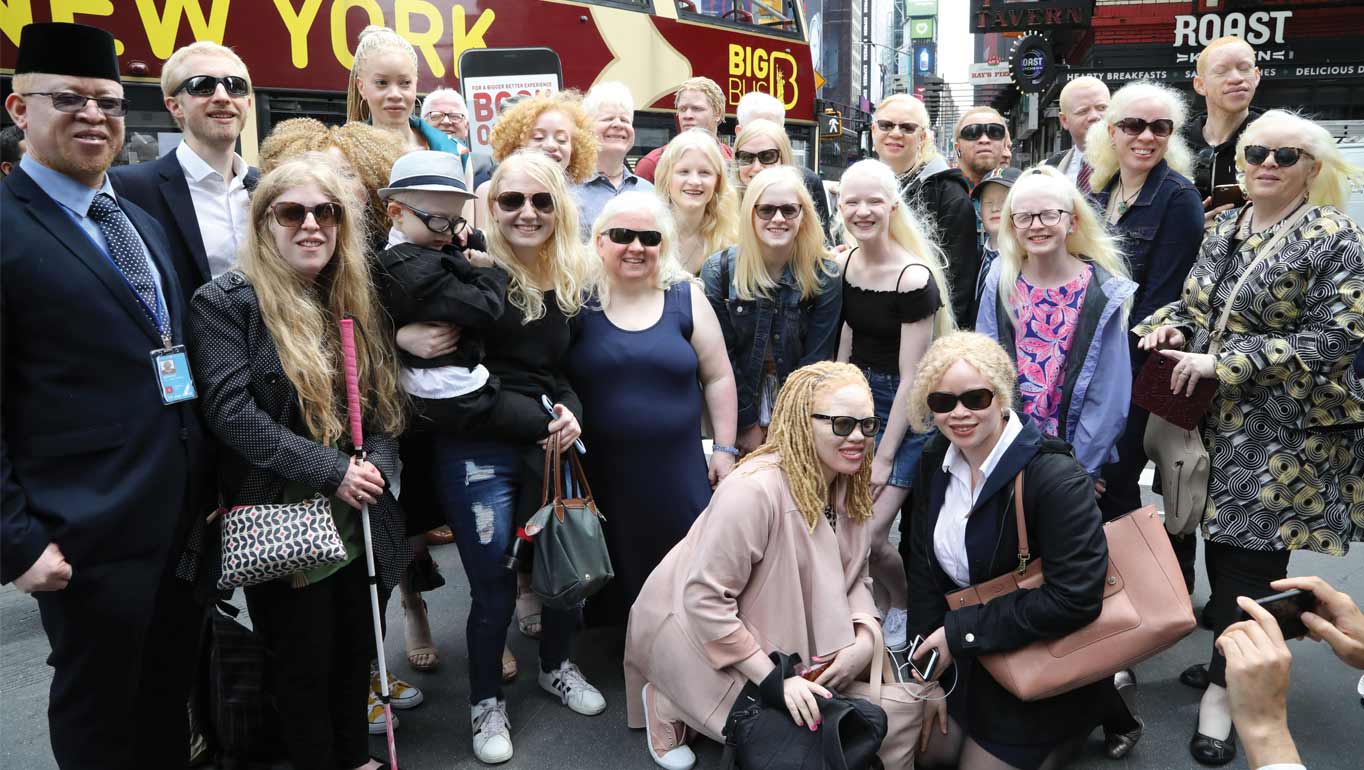Albinism is a genetic condition which is characterized by a partial to total lack of pigmentation in the eyes, skin and hair. Although it occurs throughout the world in all gender, ethnic and racial groups, the condition is rare. The exact number is unknown, but the prevalence has most recently been estimated to vary from one in 15,000 people in Europe to one in 4,000 in African countries. Lack of knowledge about the condition often leads to Persons With Albinism (PWAs) being stigmatized and discriminated against based on their physical appearance, as well as their disabilities.
Living with albinism
While all PWAs face challenges, the impact on their lives varies dramatically based on the geographic area in which they live and the resources available to meet their needs.
The lack of pigmentation in the skin makes PWAs highly vulnerable to the sun’s ultraviolet rays, exposing them to an increased risk of skin cancer. Skin cancer is the main contributor to early death in persons with albinism in the tropics, particularly sub-Saharan Africa. This is particularly tragic since most types of skin cancer are both preventable and treatable. But most PWAs in this setting have limited access to skin cancer prevention programs, sunscreen, protective clothing, effective skin cancer screening or treatment.
Lack of pigmentation in the eyes results in poor development of the retina that causes reduced or severely impaired visual acuity. This cannot be corrected by wearing glasses. While assistive devices such as monoculars can be helpful, these devices are rarely available in the Global South. PWAs also suffer from hypersensitivity to light, causing disabling visual discomfort. In many regions, even non-prescription sunglasses, that can ease this discomfort, are seldom available.
Discrimination based on their skin color and related disabilities is experienced by all PWAs but, again, the level of impact varies. To the best of our knowledge, the most extreme human rights violations occur in a number of African countries where PWAs have been the victims of ritual attacks, killings, kidnapping and trafficking of body parts. These brutal attacks are rooted in superstition and the practice of witchcraft.
More commonly, PWAs are impacted by the disabilities related to albinism. Obtaining an education can be difficult or impossible for PWAs when there is no accommodation for their visual impairments. This, in turn, results in limiting their employment opportunities and ability to be financially independent. If they work outdoors, as PWAs commonly do, lack of access to sunscreen will result in skin cancer and, where medical treatment is unavailable, premature death.
These are just a few examples of the many ways in which PWAs face tremendous barriers to enjoying basic human rights.
Protection of human rights
On April 10, 2015, the Human Rights Council of the UN adopted a Resolution to establish the mandate of an Independent Expert on the Enjoyment of Human Rights by Persons with Albinism for a period of three years. This mandate was renewed in 2018, 2021 and just recently in 2024. The work of the UN Independent Expert (UN IE) Ikponwosa Ero (2015-2021) and the current UN IE Muluka-Anne Miti-Drummond has had a powerful impact.
The creation of the mandate has resulted in the production of more than a dozen thematic reports documenting violent attacks, discrimination, lack of access to justice, healthcare and education among other challenges. The UN IE has also issued reports on visits to over a dozen countries and conducted training in human rights advocacy.
The Global Albinism Alliance
The number of regional, national and local organizations to support PWAs has grown to almost 250 worldwide. This growth presented the need to create a platform to strengthen the impact of these groups and elevate the voices of PWAs on a global level beyond the UN. In 2020, the UN IE convened a group of key leaders from the global albinism community to explore this possibility. The result was the launch of the Global Albinism Alliance (GAA).
The GAA’s mission is to: (1) help albinism organizations around the world be stronger and more impactful, (2) improve knowledge about albinism, and (3) advocate at the global level to improve the lives of people affected by albinism. We seek to fulfill this mission by working in collaboration with researchers, healthcare providers, disability rights organizations, human rights advocates and all other allies.
As climate change poses an increased threat to PWAs, the GAA has set the prevention of skin cancer and increased access to treatment as a top priority. We are engaging with the World Health Organization and building partnerships with the International League of Dermatological Societies, Rare Diseases International, GlobalSkin, the World Skin Health Coalition and the International Agency for Research on Cancer, among others.
As we observe International Albinism Awareness Day on 13 June, we hope you will all join us in celebrating the progress that has been made and committing to the GAA’s vision of “a world where persons with albinism have the best possible quality of life.”



